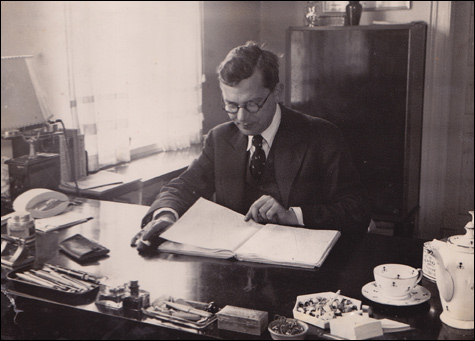
ROUGH AND READY In his reissued 1947 novel, Hans Fallada sets humble "good Germans" against the regime. |
Say what you will about the Third Reich, it's helped keep the entertainment industry in business for more than 70 years. Punch "Nazi" into the Internet Movie Database and you'll get 1164 entries, from Bertolt Brecht's Kuhle Wampe (1932) to the remake of They Saved Hitler'sBrain that's scheduled for 2011. Recently, the interest has intensified: Quentin Tarantino's Inglourious Basterds opens this week, and following in short order will be both A Woman in Berlin, based on an anonymous diary of a German woman victimized by the Red Army, and the Norwegian Dead Snow, a horror film with Nazi zombies. Still in the works: the Finnish entry Iron Sky, about Nazis on the moon, and The 4th Reich, a British splatter film starring Dr. Mengele.Nazis aren't blitzing just the movie screens this year, though — they're also invading the bookstores, with battalions of novels and non-fiction tomes published or upcoming. Like many of the recent movies, the written word is taking up the trend started last year with Valkyrie and The Reader and focusing not on the Reich's evil and the suffering it caused but rather on the "Good German." And like Inglourious Basterds, some of these new books could be accused of trivializing Nazi enormities by making them an element in a pop-genre entertainment.
Both tendencies are evident in Charles McCain's well-researched and fitfully gripping AN HONORABLE GERMAN: A NOVEL OF WORLD WAR II (Hachette; 384 pages; $24.99), a war story that features the exploits of the title naval officer, Max Brekendorf. Max isn't the luckiest guy in the German navy, serving first on the doomed pocket battleship Graf Spee and then on an equally ill-fated raider. He's not the most perceptive, either; it isn't till he gets accidentally arrested while on leave in Berlin in 1941 that he notices the regime might not be on the up-and-up. "I've been away two years fighting for my country," he explains. "How was I to know that I was in more danger from the Gestapo than the Royal Navy?" Now that he knows, however, it still takes him about another 150 pages to do anything about it.
More on top of things is Hannah Vogel, the heroine of Rebecca Cantrell's diverting murder mystery A TRACE OF SMOKE (Forge; 312 pages; $24.95). She's a journalist, after all, a crime reporter for the Tageblatt. But times were even tougher for honest newspaper people in 1931 Berlin than they are today, what with the grinding unemployment and the Brownshirts beating people in the streets. Hardened though she is, Hannah is shocked to find her gay younger brother Ernst's photo among the day's morgue shots at the police station. Her private investigation into the crime turns up a tiresome orphan and leads to another Ernst — Ernst Röhm, the brutal head of the SA, Hitler's paramilitary goons. Fortunately, along the way Hannah also meets her own honorable German, Boris, a rich guy with a nice car who disdains the Nazis.
Boris is an exception in that regard, according to Fabrice d'Almeida's HIGH SOCIETY IN THE THIRD REICH (Polity; 304 pages; $24.95). In this damning, detailed indictment of the rich, famous, and privileged who hobnobbed with Hitler, d'Almeida states that "while National Socialism was indeed a product of a powerful machine for mobilizing the masses," its success "was due above all to the elites. Without the latter's cynicism, history would not have been so tragic."
More in keeping with Cantrell's idea is Dan Fesperman's thoughtful and engrossing THE ARMS MAKER OF BERLIN (Knopf; 384 pages; $24.95). Nat Turnbull, a history professor specializing in the Third Reich and a kind of Indiana Jones of the archives, gets a boozy call from Gordon Wolfe, his estranged mentor, at 1 am. In short order, someone is dead and a 60-year-old box of documents goes missing, and Turnbull is on the case. Meanwhile, in Germany, Kurt Bauer, the wealthy arms maker of the title, is having dreams about his teenage love, Liesl. She was a spitfire, that one, never shy about her anti-Hitler views even at Reich society fêtes where Kurt's parents were trying to schmooze. His love for her draws him into the secret White Rose resistance circle. Seven decades later, Turnbull's need to solve his murder mystery threatens to uncover the truth.
Hans Fallada's republished 1947 novel EVERY MAN DIES ALONE (Melville House; 546 pages; $27) also follows the detective-story template — except that in this case, which is based on a true story, the "criminals" are the honorable Germans and the investigator is with the Gestapo. Otto Quangel keeps his mouth shut and works hard as a foreman at his Berlin factory. His wife, Anna, is a model German hausfrau. Then comes news of the death of their only son in the invasion of France. They cannot remain mute any longer, so they write subversive statements on postcards that they leave in random spots about the city. A feeble gesture? The Nazis don't think so, and they make apprehending "the Hobgoblin" a priority. Fallada's prose is rough and ready, but it grabs you by the throat when he describes Gestapo interrogations, or details the treachery of the Quangels' feckless fellow Berliners, who are like characters out of Alfred Döblin's Berlin Alexanderplatz.